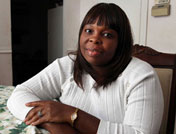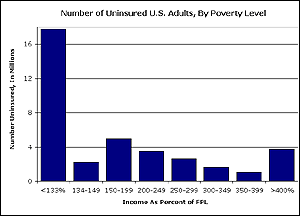Michael Rhoads seems just the sort of person who would benefit from health care overhaul legislation.
He and his wife, working parents of two children, lack health insurance, which they say they cannot afford. At the same time, the combined annual earnings of this southwest Philadelphia family are such that they do not qualify for Medicaid, the state-federal health insurance program for the poor.
Congress is seeking to bridge the gap they face. But Rhoads says the likely cost of the solution would still be beyond his family’s budget.
“Health care for everyone that sounds wonderful,” says the 35-year-old, an outreach coordinator for a low-income community health clinic. “In reality, when it comes down to it, it is another big bill that just doesn’t fit.”
His is a dilemma that faces many of the millions of Americans who are intended beneficiaries of the overhaul: they make too little, and yet too much, to capitalize on the legislation’s signature features.
In an effort to reduce the ranks of the uninsured, Congress is proposing to expand Medicaid for the poorest Americans, and to provide subsidies to millions of others to help buy private coverage. But a sizeable number of those who would qualify for subsidies–especially people who would be right above the Medicaid cutoff–could still find health care unaffordable; premiums and out-of-pocket costs like deductibles and co-pays could add up to hundreds or thousands of dollars a year.
Those who miss the cut for Medicaid face sharply higher costs in a private insurance plan. “You have a very steep cliff,” says Judith Solomon, a senior fellow at the Center on Budget and Policy Priorities in Washington. Many might have to choose between insurance and necessities like rent and food, say experts such as Richard Curtis, president of the Institute for Health Policy Solutions in Washington.
“These are not people with discretionary income,” says Curtis. “Asking them to pay any substantial share (of insurance costs) I worry about that.”
To be sure, millions of vulnerable Americans would get a safety net if legislation now headed to House-Senate negotiations becomes law. Both chambers of Congress are proposing to raise the income limits for Medicaid, and to include adults without children for the first time. Those moves alone would add an estimated 9.5 million childless adults to the program under the Senate bill.
But a large chunk of the uninsured population would just miss the Medicaid expansion. According to the Kaiser Family Foundation, 7.2 million adults earning less than twice the federal poverty level — about $21,000 for an individual and $44,000 for a family of four — would earn too much to qualify for the expanded Medicaid envisioned by the Senate. Millions more have incomes slightly above that level. (KHN is a part of the foundation.)
At the core of the overhaul is a requirement that most individuals and families obtain health insurance or else risk a federal fine. Under the Senate bill, that penalty would reach as much as $750 per person, or 2 percent of household income, whichever is greater, although there would be a “hardship” exemption in cases where the cost of premiums totaled 8 percent or more of income.
In general, employees would have to purchase the insurance offered at their work, assuming it meets certain minimum standards. A series of “exchanges” private marketplaces regulated by the government would be set up to offer coverage to people without insurance or to those whose insurance at work is expensive. Some small businesses would also be given access to purchase insurance for their employees.
People earning up to four times the poverty level about $43,000 for an individual and $88,000 for a family of four — would receive federal subsidies to help them buy policies on the exchanges. The subsidies would operate on a sliding scale that would require those at the upper end to pay a larger share of their income to get coverage, although even those at the lower end would have to foot some of the costs.
Georgetown University’s Center for Children and Families assessed the prospects for several Philadelphia-area families under the overhaul based on their current earnings and insurance status. The analysis is pegged to the Senate bill, which most political analysts consider the likely blueprint for any final health legislation that Congress approves.
The families examined for this article most likely would qualify for the exemption and if they chose to take advantage of it, would be left in the same place they are now: without health insurance.
Rhoads and his wife have been uninsured for most of their adult lives. They live along the Woodland Avenue corridor, one of the city’s toughest areas, with above average crime and joblessness. And they never seem to have enough money to pay their bills, much less to buy health insurance.
They go to the doctor only when they are so sick that they cannot work. Over the years, Rhoads’ wife, 32, who asked that her name not be used to maintain her privacy, has incurred large unpaid emergency room bills. Recently, she developed a case of the H1N1 virus and sought treatment at a medical clinic called the Health Annex where Rhoads works part-time, trolling for clients at homeless shelters and food kitchens.
“I’m trying to feed my kids. I’m not thinking about paying medical bills,” she says, through a surgical mask. The couple has two daughters, 13 and 15. Both receive free care under a program for children in low-income families known as the Children’s Health Insurance Program, which would continue to operate under the Senate but not the House overhaul legislation. Their household income is about $40,000 a year; she is currently the main bread winner, working as a certified aide at a nursing home.
Her employer offers health insurance, but to cover the two of them, even the cheapest option would cost about $350 a month, which they say they cannot afford. The cost is high enough to make them eligible for a government subsidy to purchase insurance through one of the new exchanges. Under the Senate bill, however, they would also be expected to contribute about $200 a month toward the cost of the premiums, or about 5.8 percent of their income. Co-payments and deductibles would likely add several hundred dollars more to their annual health care bill.
Rhoads says the benefit is nice but still unaffordable. His wife says she does not understand a system in which she would have to set aside part of her paycheck to cover insurance premiums, and then have to pay again, to cover deductibles and other shared costs, whenever she visits the doctor. “You know, I feel like that is where you are ripping me off,” she says.
Danielle Simmons, a medical assistant and student at the Community College of Philadelphia who is also uninsured, could be in more perilous shape. Under the Senate bill, Simmons, who says she earns about $36,000 a year, would have to pay about 8.1 percent of her income, or about $246 a month, for her share of premiums on a government-subsidized insurance policy.
A single parent, Simmons, 23, says she already has more bills than she can handle. She pays $840 a month for her five-year-old to attend a Christian pre-school program. (Like the Rhoads’ children, her daughter qualifies for CHIP.) The heating oil bill for the house she shares with her sister is expected to hit $4,000 this winter. She has $15,000 in unpaid student loans.
Adding another expense, even to cover health insurance, she says, “would not be on my radar.” Instead, she tries to keep on top of her health using her medical knowledge and self-discipline. Diagnosed with lupus, an auto-immune disorder, Simmons says keeps her condition under control through careful diet. She also is zealous about hygiene and prays a lot.
The potential gaps in coverage underscore how budget considerations have been driving the debate in Washington. While they want to cover as many people as possible, lawmakers are also trying to keep the tab below $900 billion over a decade, a marker set by President Barack Obama.
The Senate bill would cost less and be less generous — than the House measure. Affordability looms as a major issue for the two chambers to negotiate. As it stands, the Senate would expand Medicaid to include people earning up to 133 percent of the federal poverty level, currently about $33,000 for a family of four; the House would raise the ceiling to 150 percent. The Senate bill is also much less munificent when it comes to subsidies. A study by the Urban Institute this month found that the poorest and sickest families qualifying for subsidies under the Senate bill could end up having to pay as much as 13.4 percent of their income on health care costs nearly double the 7.6 percent they would pay under the House version.

Mahawah Sillah owes $20,000 for emergency-room care. There is a backlog for state health aid, she can’t afford insurance offered by her employer, and federal changes are unlikely to help. (Laurence Kesterson/Philadelphia Inquirer)
To cushion the blow, the Senate would help individual states set up basic health plans for low-income individuals and families who don’t qualify for the expanded Medicaid. How well those programs might work is far from clear. A comparable idea already in place in Pennsylvania, known as adultBasic, has seven times more applicants than enrollees because of funding shortfalls related to the state budget crisis.
Mahawah Sillah, a diet technician at a Philadelphia hospital, who has diabetes and hypertension, is one of those waiting for help. She earns about $41,000 a year, and has three children. Her earnings are about 185 percent of the poverty level; in theory that makes her eligible for the basic health assistance from the state but she is stuck in the backlog. Her children are covered by the CHIP program.
She also appears unlikely to gain much from the pending overhaul legislation. She makes too much money to qualify for the planned Medicaid expansion. With monthly mortgage and child-care payments, and thousands in legal bills for her husband’s immigration problems, she says she can’t afford the insurance offered by her employer.
The Senate bill would require her employer to kick in some money to help her buy insurance. But she would still face about $200 a month for premiums about double what she says she can currently handle.
A few months ago, Sillah, 40, landed in the emergency room, after a fall that was related to her high-blood pressure, and incurred a $20,000 bill, which she says she cannot pay. Lately, she has been hearing from bill collectors, who want to know when she is going to start paying off the debt. Her prescription for dealing with her own personal health care crisis: “I screen my calls,” she says.







